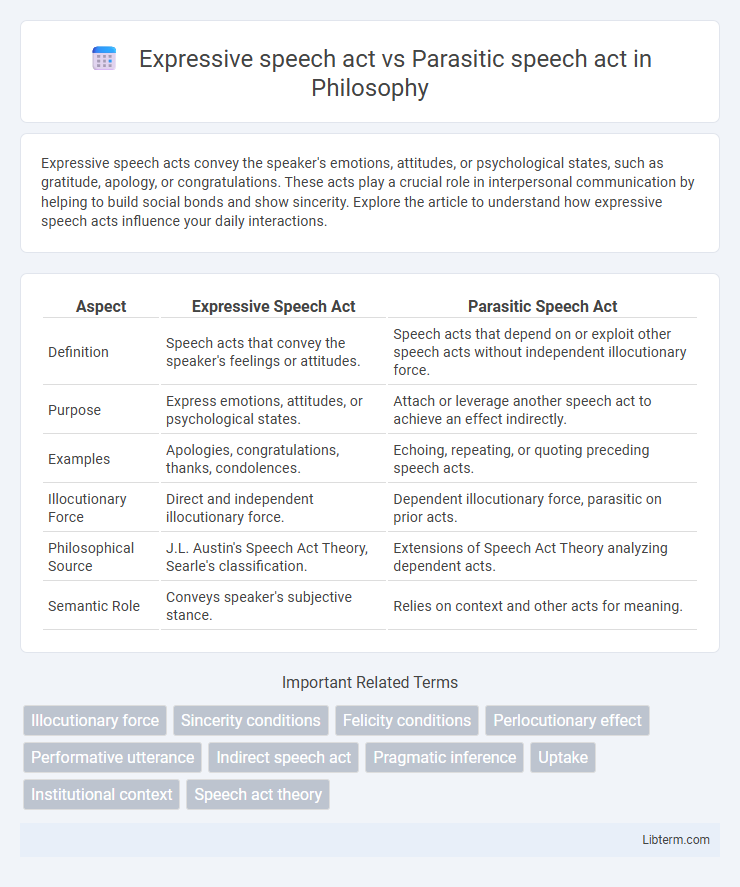Expressive speech acts convey the speaker's emotions, attitudes, or psychological states, such as gratitude, apology, or congratulations. These acts play a crucial role in interpersonal communication by helping to build social bonds and show sincerity. Explore the article to understand how expressive speech acts influence your daily interactions.
Table of Comparison
| Aspect | Expressive Speech Act | Parasitic Speech Act |
|---|---|---|
| Definition | Speech acts that convey the speaker's feelings or attitudes. | Speech acts that depend on or exploit other speech acts without independent illocutionary force. |
| Purpose | Express emotions, attitudes, or psychological states. | Attach or leverage another speech act to achieve an effect indirectly. |
| Examples | Apologies, congratulations, thanks, condolences. | Echoing, repeating, or quoting preceding speech acts. |
| Illocutionary Force | Direct and independent illocutionary force. | Dependent illocutionary force, parasitic on prior acts. |
| Philosophical Source | J.L. Austin's Speech Act Theory, Searle's classification. | Extensions of Speech Act Theory analyzing dependent acts. |
| Semantic Role | Conveys speaker's subjective stance. | Relies on context and other acts for meaning. |
Understanding Expressive Speech Acts
Expressive speech acts convey the speaker's emotions, attitudes, or psychological states, such as apologies, thanks, or congratulations, effectively communicating subjective experiences to the listener. Understanding expressive speech acts involves recognizing the emotional content embedded in utterances, which plays a crucial role in interpersonal communication and social bonding. Unlike parasitic speech acts, which rely on others' prior utterances and can be context-dependent, expressive speech acts stand independently in expressing genuine speaker sentiments.
Defining Parasitic Speech Acts
Parasitic speech acts are communicative actions that rely on preexisting speech acts to achieve their intended effect without generating new illocutionary force. Unlike expressive speech acts, which directly convey the speaker's emotions or attitudes, parasitic speech acts depend on the context and force of another utterance to gain pragmatic significance. This dependency highlights the interconnected nature of speech acts, where parasitic utterances function by attaching themselves to prior speech events rather than standing alone semantically or pragmatically.
Core Differences Between Expressive and Parasitic Speech Acts
Expressive speech acts directly convey the speaker's psychological state or emotions, such as gratitude, apology, or congratulations, reflecting genuine intentions and social functions. Parasitic speech acts, in contrast, depend on other speech acts to derive meaning, often functioning as secondary or supportive utterances like clarifications or elaborations that do not stand independently. The core difference lies in expressives manifesting intrinsic affective content, while parasitic acts rely on the context of primary utterances to achieve communicative effect.
Structural Features of Expressive Speech
Expressive speech acts structurally manifest through clear, intentional linguistic cues such as interjections, exclamations, and evaluative adjectives that convey the speaker's emotions or attitudes. These structural features include direct statements of feeling (e.g., "I'm sorry"), modal verbs to indicate mood, and specific intonations that emphasize sincerity and personal involvement. Unlike parasitic speech acts, which rely on the context of preceding utterances for meaning, expressive acts possess standalone syntactic structures that explicitly communicate the speaker's expressive intent.
Mechanisms of Parasitic Speech Acts
Parasitic speech acts operate by exploiting the context and pre-existing discourse to carry out indirect communicative functions without introducing new information, often relying on the listener's inferential reasoning. These mechanisms involve embedding secondary illocutionary acts within primary utterances, enabling speakers to achieve complex intentions such as criticism or suggestion covertly. Unlike expressive speech acts, which directly convey the speaker's emotions or attitudes, parasitic speech acts manipulate conversational implicature and pragmatic context to influence interpretation subtly.
Functions and Intentions in Expressive Speech
Expressive speech acts function to convey the speaker's psychological state or emotions, such as gratitude, apology, or congratulations, intending to express feelings rather than change the external situation. Their primary intention is to reflect subjective attitudes and establish social bonds by sharing emotional experiences. Unlike parasitic speech acts, which rely on other speech acts to gain meaning or perform additional functions, expressive speech acts stand independently in communicating personal sentiments.
Pragmatic Implications of Parasitic Speech
Parasitic speech acts rely on preceding utterances to derive meaning, often functioning as meta-communication that references or modifies prior discourse, whereas expressive speech acts directly convey a speaker's psychological state or attitude. Pragmatic implications of parasitic speech include the potential to shape conversational grounding, manage speaker-hearer relationships, and influence implicature by leveraging the context established by the original speech act. This interdependence can enhance nuance and subtlety in communication but may also lead to ambiguity or misinterpretation if the referential link is unclear.
Contexts Where Expressive Speech Acts Dominate
Expressive speech acts dominate in contexts involving personal emotions and social interactions, such as apologies, congratulations, and condolences, where speakers convey feelings or attitudes. These acts are prevalent in intimate conversations, therapy sessions, and ceremonies, emphasizing sincerity and emotional connection. Unlike parasitic speech acts, which rely on other speech events, expressives stand independently to directly communicate the speaker's internal state.
Identifying Parasitic Speech in Communication
Parasitic speech acts occur when speech content relies on or attaches itself to previous utterances without contributing new information, often disrupting the flow of communication. Identifying parasitic speech involves recognizing phrases or segments that do not advance the conversational goals but instead echo or depend on prior statements, such as fillers, repetitions, or irrelevant interjections. Effective communication analysis distinguishes expressive speech acts, which convey genuine emotions or attitudes, from parasitic ones that function as linguistic noise or redundancy.
Impact of Speech Act Types on Interpersonal Interaction
Expressive speech acts, such as apologies, thanks, and congratulations, directly convey the speaker's psychological state, fostering empathy and strengthening interpersonal bonds through emotional transparency. Parasitic speech acts, which rely on or parasitize existing speech for meaning, may create misunderstandings or ambivalence, potentially weakening trust and the clarity of communication. The type of speech act employed significantly influences relational dynamics by either enhancing mutual understanding or introducing ambiguity that affects conversational flow and social cohesion.
Expressive speech act Infographic

 libterm.com
libterm.com